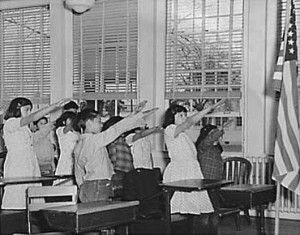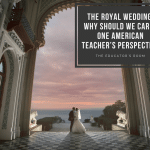[fusion_builder_container hundred_percent=”yes” overflow=”visible”][fusion_builder_row][fusion_builder_column type=”1_1″ background_position=”left top” background_color=”” border_size=”” border_color=”” border_style=”solid” spacing=”yes” background_image=”” background_repeat=”no-repeat” padding=”” margin_top=”0px” margin_bottom=”0px” class=”” id=”” animation_type=”” animation_speed=”0.3″ animation_direction=”left” hide_on_mobile=”no” center_content=”no” min_height=”none”]
If you are an educator, and especially an AP Teacher, or a current or former recipient of an AP education, you could not have missed the news this week that the House Common Education Committee in the Oklahoma State Legislature passed 11-4 (straight down party lines) HB 1380, a bill that removes all funding from AP US History (APUSH) classes in the state, effectively banning it. According to state Representative Dan Fisher (R-Yukon), the measure’s author, the problem with APUSH is that it a) imposes a national curriculum and b) omits “American Exceptionalism.” While both arguments are ridiculous on their face, and I will address them in a moment, his latter argument echoes the recent debates in the Colorado State School Board over AP US History: that its lack of “American Exceptionalism” and disturbing inclusion of lessons about dissent are corrupting to our advanced placement high school students. I would argue that this sudden virulent focus on “American Exceptionalism” in high school curriculum is instead a reflection of a disturbing descent into American idiocy.
This most recent vote in Oklahoma and the debate in Colorado are only two examples of a much bigger push instigated by the Republican National Committee last August when it publicly berated the AP US History exam, saying it “reflects a radically revisionist view of American history that emphasizes negative aspects of our nation’s history while omitting or minimizing positive aspects.” The Colorado School Board followed this up by insisting the course was not “patriotic” enough and proposed changes to it that would “ban any material that could lead to dissent.” Similar legislation is proposed in the state houses in Georgia and North Carolina. What is going on here? Unfortunately, it is nothing new in American public education policy.
First, Rep. Fisher’s argument that APUSH is a sinister attempt to create a national curriculum is factually incorrect. APUSH and all other Advanced Placement courses are designed and administered by The College Board, a private organization. They are closely monitored, college level curriculum that allow high school students to dive deep into high concept thinking, focused document-based writing, and a massive breadth of general knowledge. Colleges and universities across the country accept passing and high scores on AP exams as already-earned college credit. No student is required to take an AP course and AP is not offered in all districts or available to all students who would like to take it, as much as most AP teachers wish. While AP is in no way a national curriculum, I personally see no threat in a national history and civics curriculum. In fact, the disparities in what graduating high school students are required to know and understand about their civic history and responsibilities from state to state probably accounts for a lot of the divisions we are seeing in modern American society. It is clearly responsible for the thinking going on in these state legislatures.
Second, the “American Exceptionalism” argument is as old as public education. Rep. Fisher and his ilk are cogs in a historical wheel that keeps turning because of their very insistence on pretending the wheel isn’t there. As we like to say in APUSH: you can’t make better decisions now and in the future if you don’t understand the past. Clearly, that is not a concern in the Oklahoma House. Believing that you are innately better than the “other” means you are unwilling to learn, to grow, or to participate with the rest of the world. It embitters the “exceptionalist” believer into a state of bigotry and permanent victimhood, and the oppressor into the false belief he is the oppressed. And of course, when a mind is closed off to new ideas or challenging itself, then learning stops. The dumber, less critically-thinking a population, the easier it is to manipulate them. This history currently repeating itself is a corruption of some of our earliest American civic values.
The idea of a connection between universal public education in the United States and the maintenance of democracy emerged even before the U.S. Constitution was written. Thomas Jefferson believed tyranny could not be prevented unless the country provided for the illumination of “the minds of the people at large, and more especially … knowledge of those facts which history exhibiteth [/fusion_builder_column][fusion_builder_column type=”1_1″ background_position=”left top” background_color=”” border_size=”” border_color=”” border_style=”solid” spacing=”yes” background_image=”” background_repeat=”no-repeat” padding=”” margin_top=”0px” margin_bottom=”0px” class=”” id=”” animation_type=”” animation_speed=”0.3″ animation_direction=”left” hide_on_mobile=”no” center_content=”no” min_height=”none”][sic], that, possessed thereby of the experience of other ages and countries, they may be enabled to know ambition under all its shapes, and prompted to exert their natural powers to defeat its purposes…” (in A Bill for the General Diffusion of Knowledge, 1779). If that’s not a call for educated dissent, I don’t know what is. Benjamin Rush suggested that “developing republican citizenship formed the foundational purpose of public education” and that schooling should create a “national identity.” However, when the Constitution was ratified in 1787, it included no explicit guarantee of a right to an education. Because of that, each state was left to its own devices to decide what, or even if, education was important for its students. As more and more immigrants began arriving in the late 19th and early 20th centuries, it was thought that a national program to teach American values could help the new arrivals. But by the 1910s, those white, former Europeans who had achieved “true American” status decided they’d had just about enough of these browner, more exotic Eastern European and Asian immigrants pouring in, and the Americanization Movement was born. In order to assimilate the masses of immigrants in early 20th century America, over 30 states and thousands of school boards passed “Americanization” program laws requiring (of course) only English language and an extensive American cultural education that was more about belittling and quashing ethnic identities than about teaching a common American value system. By the 1920s, the term “American Exceptionalism” had arrived. This idea states that America is special, a gift among nations, a shining city upon the hill–and by extension, in its modern version, cannot be criticized. Any criticism, it is claimed, makes America somehow look weak or “unexceptional.” These ideas, unrestrained by critical thought, are ones that create bigotry, segregation, and led almost directly to the strain of nationalism that brought on Eugenics, the Chinese Exclusion Act, and other super awesome gift-among-nations laws. Ironically, and I’m sure that Rep. Fisher and the RNC would not be happy to know this, it is NOT revisionist history that the term “American Exceptionalism” itself can first be found in the papers of the American Communist Party. In fact, Stalin used it to blast the American communists for thinking they were somehow better than the rest of the communists trying to make a go of it in Europe in the 1920s. Nobody tell the RNC.
The U.S. was the first modern country born out of philosophical ideas; that indeed is an exceptional piece of history. As a history and civics teacher, I am in love with the idea of how ideas can create change – how classically educated, albeit very flawed, men combined what they knew of the classical world together with new Enlightenment and humanist ideas, then argued vociferously, and finally decided to just do the experiment. Massively bad decisions were made – ones that led to the dehumanizing of entire populations of people. Horrors were perpetrated. Tragedies abounded. All with consequences we must still deal with today, including deeply embedded institutionalized inequality, often felt most heavily by our students. But because those original ideas were not static, but rather living, breathing ideas about natural rights, liberty, fraternity, equality, and the common good – they resulted in an American history that has progressively (though sometimes at what feels like a glacial pace) learned that the expansion of those ideas, not limiting them, is in everyone’s best interest. Amongst those unsavory, and yes, shameful, strains of our historical DNA are planted the likes of abolitionists, suffragists, progressives and populists, civil rights movements, environmental activists, and the writers, poets, musicians, inventors, scientists, oh – and teachers, that have all continuously worked to transform that cultural and historical DNA by adding more and more of that liberty, equality, and common good into the mix. It is not unpatriotic to see our history for what it is because without the rose colored glasses, we are much more prepared to make a better future and remain resolute in our desire to continuously make life better for all who share the nationality called “American.” True exceptionalism would be the opposite of closing ourselves off to new ideas, to dissent, to dialogue, or to the opportunity for all students to participate in advanced placement courses that challenge their thinking.
Everything I’ve written here is most likely Rep. Fisher’s biggest nightmare. Those like him operate from a place of fear and need for control over others. That is why students learning the ideas of dissent are so frightening to them. If I could, I would copy Dr. King’s Letter from a Birmingham Jail on the walls of the Oklahoma House in indelible ink. Dr. King believed fervently that “the arc of the moral universe is long, but it bends towards justice.” He would not in any way be surprised by the likes of this proposed law banning AP US History, but he would not sit still and accept it either. As an AP US History and AP US Government teacher, I take my place proudly with my fellow AP social studies educators as the new outlaws in education policymaking. Like Dr. King, I am not surprised by this repetition of history couched in terms like “exceptionalism” and “patriotism.” But that history does not have to repeat. We cannot remain silent, or even just loudly complain, about the actions of state bodies that try to curb our students’ access to understanding and critical thinking. The very future of that arc of the moral universe, of our civic society, and of our country is at stake. It is now time for History and Government teachers – indeed, all educators – to consider, in the words of Dr. King, “not whether we will be extremists, but what kind of extremists we will be.”[/fusion_builder_column][/fusion_builder_row][/fusion_builder_container]






Leave a comment